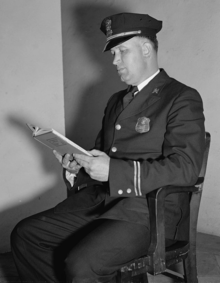White House Police Force
The White House Police Force was a security police force formed in 1922 to protect the White House and the President of the United States. It became part of the United States Secret Service in 1930. It was renamed the Executive Protective Service in 1970 and then the Uniformed Division of the Secret Service in 1977.

History

The White House Police Force was created on October 1, 1922, at the request of President Warren G. Harding to provide police and security services to the White House and Executive Office Building.[1] Initially the President or his appointed representative supervised the force.[2]
The White House Police Force was placed under the command of the Chief of the United States Secret Service in 1930. In 1970, it became the Executive Protective Service and its roles and size were expanded. Its responsibilities now included the protection of the White House, foreign missions in and around Washington, D.C., and the Naval Observatory. Together they provide protection for the following: The President and Vice President of the United States and their immediate families, presidential candidates, the White House Complex, the Vice President's Residence, and foreign diplomatic missions in the Washington, D.C., metropolitan area.[3]
The Executive Protective Service became the Uniformed Division of the Secret Service in 1977. When the United States Treasury Police was merged into the Uniformed Division of the Secret Service in 1986[1] it became responsible for the main Treasury building and the Treasury Annex building, both of which are adjacent to the White House.
Fallen officer
Since the establishment of the White House Police, one officer has died in the line of duty.[4]
| Officer | Date of Death | Details |
|---|---|---|
| Officer Leslie William Coffelt | Shot in the Truman assassination attempt |
See also
- List of United States federal law enforcement agencies
- Federal Police
References
- "Secret Service history". United States Secret Service. Retrieved 28 May 2011.
- 42 Stat. 841
- Frederick Kaiser, "Origins of Secret Service Protection of the President: Personal, Interagency, and Institutional Conflict", Presidential Studies Quarterly, 1988, vol. XVIII, num. 1, p. 102. These
- The Officer Down Memorial Page
Bibliography
| Wikimedia Commons has media related to White House Police Force. |
- Donald A. Torres (1985). Handbook of Federal Police and Investigative Agencies. Greenwood Press. ISBN 0-313-24578-9 and ISBN 978-0-313-24578-7